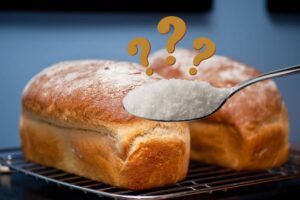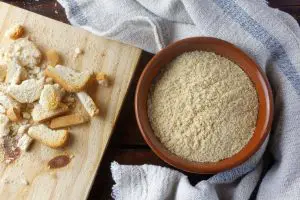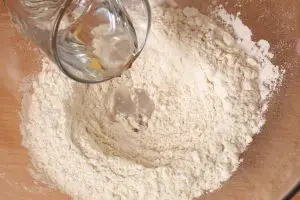When making bread, there are very many different recipes out there that might ask for sugar to be added into the dough. This might not be every single recipe (in fact, it rarely is) but for the rare cases in which it is added, it can do some interesting things.
In this article, we’re going to talk a little about what, specifically, sugar does to bread, and how that impacts the bread that we eat in our homes.
What does sugar do to bread?
Sugar can do a range of different things to bread, and these things are but a few.
Fermentation
The fermentation process is what gives bread its rise. The reason for this is that the yeast colony within a loaf of bread absorbs and digests the sugar within the carbohydrates in the flour, leading to digestion taking place.
This digestion results in carbon dioxide being produced. These bubbles of gas are caught within the wet dough and trapped within the strength of the gluten strands developed during kneading.
So, to cut a long story short, bread rises as part of fermentation. Fermentation is aided by the process of sugar, whether granulated sugar or sugar in the form of carbohydrates.
If you add granulated sugar to bread, it will dissolve into the dough, where it will feed the yeast quickly, leading to a quicker, more dramatic rising process.
Flavor
While sweet bread isn’t quite what you might be looking for in a sandwich loaf, having some level of sweetness within the loaf as a whole can be delightful! Therefore, the use of sugar can help to build an overall flavor.
Naturally, bread can be a little salty and earthy, as a legacy of the salt and cooked flavor that makes up most of the bread. Adding a little sugar can make the overall flavor a little more complex, resulting in a truly fascinating final flavor – how tasty!
Browning
The browning process of food is typically caused by the controlled burning of something. For example, solid fats like butter contribute to browning as the solids within them cook slowly, becoming darker in coloration and more interesting in overall flavor.
This is also the case with sugar, which will brown gently over time, becoming richer and more complex as it cooks. Using sugar in bread can boost this browning process, leading to a well-browned loaf of bread in a reduced amount of time.
Softening
When sugar is dissolved into bread dough, it can actually attract moisture and water molecules toward it. This process removes some amount of water from within and nearby flour molecules which, in turn, leads to the gluten developing less intensely.
To ensure that the bread is as soft as possible, a number of industrial processes add sugar, which serves to draw moisture away from the flour, leading to a simpler, less chewy loaf of bread.
However, you still need some level of gluten for the bread to rise evenly and properly, so the sugar and gluten balance is just that: a balance. To be sure that the combination is one that works well, we would recommend doing some experimentation.
Freshening
Keeping bread from going stale is something of a constant battle in many homes around the world. The loss of moisture from bread can be quite severe indeed, especially in homemade or artisanal bread. When your homemade bread goes stale, therefore, it’s predictable and frustrating all at once.
Sugar is a little better at retaining water than flour alone, meaning that the total loaf itself is better at retaining moisture. In turn, this means that the bread takes a little longer to go stale, which can be ideal.
Do you need to add sugar to bread?
No, you certainly don’t need to add sugar to bread. There are a number of advantages to doing so, but it’s not a necessary step in the bread making process at all!
Traditionally, bread is barely made with more than flour, water, salt, and yeast. Sugar is, of course, not included in that list, and doesn’t need to be.
However, there are some types of bread that do require sugar. They may be sweeter loaves of bread overall, or they could simply be flavored bread that needs a base level of sweetness to be as tasty as it can be.
The only time in which we might consider sugar a needed ingredient for bread would be a time when you’re making sweet bread – something like brioche or another enriched bread.
Why avoid adding sugar to bread?
There are also some reasons why you might want to avoid adding sugar to bread – it’s not always a great idea, and can, in fact, detract from a loaf.
Too much browning
While a little sugar in a loaf of bread is sure to improve the browning overall, you can get too much of a good thing, here. Eventually, the browning will tip the scales toward being burned.
Dough naturally contains a small level of sugar that leads to browning which can be seen with any bread. If you add too much sugar, you can upset the balance of the dough, leading to a bread loaf that’s much more likely to burn than it otherwise would be.
Health concerns
If you’re health-conscious, then you’ll be well aware that adding excess sugar to a loaf of bread isn’t really a good thing. It will increase the calorie count, which will make the bread more unhealthy overall, which is certainly not ideal.
If you omit the sugar from a bread recipe, you’re very likely not really sacrificing much, if anything. Therefore, it’s not worth becoming reliant on it overall. Instead, aim to cook without it, and add it sparingly.
We hope that this article has given you some level of educational insight into the world of sugar in bread. It can be something a little more complex than you might hope, but it doesn’t have to be impenetrable – you can crack the code yourself, and make some utterly delicious bread!






